How an Indian teenager became the youngest world chess champion
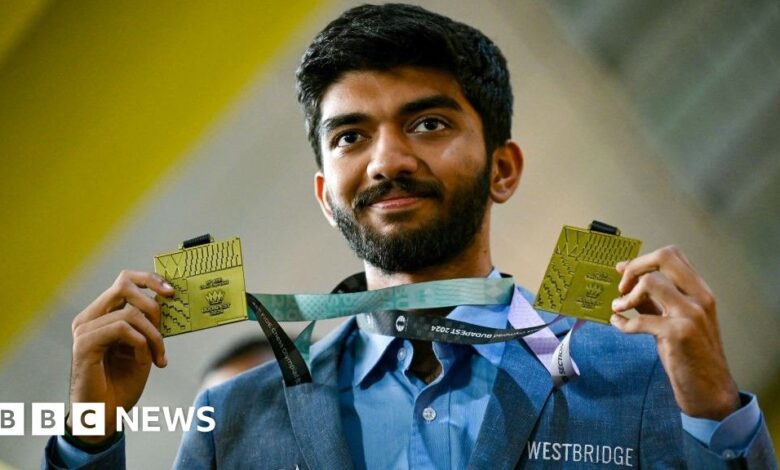
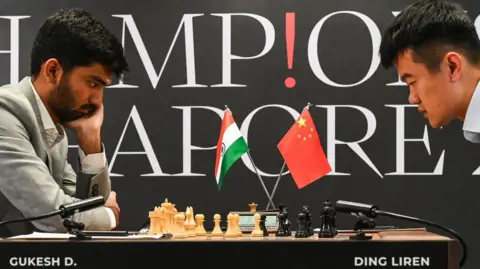 AFP
AFPIndian teenager Gukesh Dommaraju shocked the chess world on Thursday by becoming the youngest world champion at just 18 years old.
The Chennai-born prodigy defeated defending champion Ding Liren of China in a thrilling match held in Singapore in which he participated as a challenger. The FIDE World Chess Championship has a prize fund of 2.5 million USD.
It marked the pinnacle so far of his career, the greatest moment in his long line of achievements.
Gukesh became a grandmaster at the age of 12 years and 7 months and even then, he openly said that he dreamed of becoming a world champion.
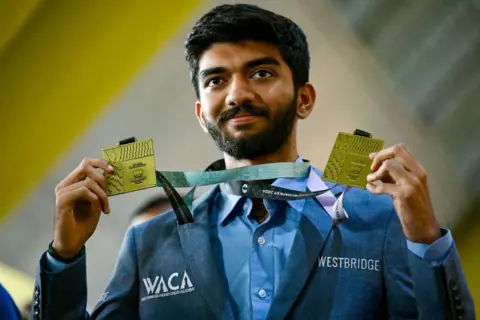 Getty Images
Getty ImagesIn fact, he said he had cherished such an ambition since he was 7 years old when he was a spectator of the world championship match between Viswanathan Anand and Magnus Carlsen in 2013.
As he confessed in the press conference after his dramatic victory over Ding, he just didn’t think it would happen so soon.
Gukesh is the 18th world champion since Wilhelm Steinitz won the first title match in 1886.
Born in May 2006, Gukesh is also the youngest player to reach this peak.
He comfortably improved the previous record held by Garry Kasparov (born April 1963), who was 22 years old when he won the championship in Moscow in November 1985 by defeating Anatoly Karpov.
The match lasted 14 games with two wins in 13 games. It looked like the 14th game was heading towards a draw.
In that case, there will be tiebreak matches played with increasingly shorter control times.
But Ding made a mistake on move 55 and Gukesh exploited the error to claim the title.
Over the past three years, this young player has achieved a series of extraordinary achievements, culminating in this victory.
Gukesh won individual gold medals for best performance in the last two Olympics. He led India to a team bronze medal in Chennai in 2022 and a gold medal in 2024 in Budapest.
He also won the Candidate Competition – which gave him the right to challenge Ding Liren.
Earlier in his teens, Gukesh had been ruled out as a potential challenger by his mentor, former world champion Viswanathan Anand, or “Vishy Sir” as Gukesh called him. He thought Gukesh simply didn’t have enough experience.
Indeed, Gukesh suffered a devastating loss in the mid-way stage, but then he tried his best to win the next round and eventually emerged victorious.
In the title match, Gukesh lost the first game and equalized by winning the third game, then he took the lead in game 11 and Ding equalized by winning game 12.
Match 14 was clearly tense with the title and a $2.5m (£1.98m) prize fund on the line, but the teenager kept his nerves in check.
Gukesh is clearly an extraordinary talent but this is not a romantic story about a lone ranger who surprises the world. Chennai GM is at the cusp of a robust chess ecosystem, one of the best, perhaps the best, in the world.
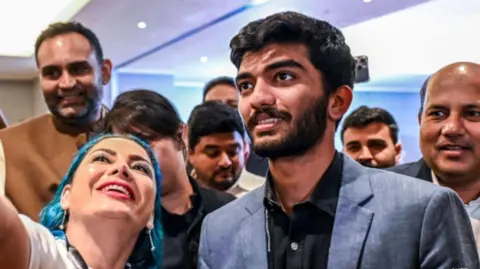 Getty Images
Getty ImagesGukesh also received strong support from his parents, the chess organization in India and his school.
India has more than 85 grandmasters, many of whom are not old enough to drive.
Indian teams were recently successful in winning both the Open Gold Medal (with Gukesh at the helm) and the Women’s Gold Medal at the most recent Olympics in Budapest.
Those grandmasters are at the top of the pyramid with over 30,000 ranked players, because a large number of Indians play officially recognized tournaments.
Gukesh has been a professional footballer since he was about 10 years old. He was mentored by Viswanathan Anand, a five-time world champion.
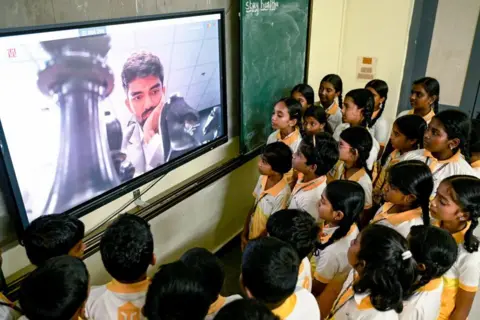 AFP
AFPHe is sponsored by Westbridge Capital, which supports the Westbridge Anand Chess Academy, a leading coaching center run by Anand.
Gukesh’s parents are both doctors, his father Rajinikanth is a surgeon and mother Padma is a microbiologist. Both put their careers on hold to promote their sons.
Chess became an expensive game when a child had to travel abroad for several months every year, so his parents not only spent their earnings to support their son but also asked friends to help fundraise for him. Gukesh’s career until it took off.
Importantly, he also received support from his school, Velammal Vidyalaya in Mogappair, which allowed him to take leave.
Gukesh also has hobbies beyond chess – he meditates, swims and plays tennis.
His stated goal is simple – he wants to become the best chess player in the world – replacing the current number one, Magnus Carlsen.
He also wants to have a “very long career at the top”. As he sees it, this title is just a step, albeit a very important one, in that life journey.





